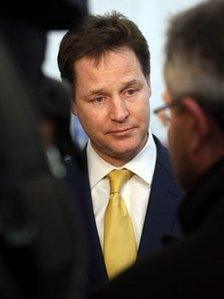Clegg extends city deal to 20 more English zones
- Published

Nick Clegg said the UK economy as a whole would benefit from being less London-centric
Twenty more areas of England are to be given greater independence from Whitehall under the "city deal" scheme, deputy PM Nick Clegg has announced.
During a speech in London, Mr Clegg said the British economy needs "major rebalancing" to shift focus away from London and south-east England.
Eight of England's major cities outside of London are already part of the initiative to boost jobs and growth.
In response, Labour said Mr Clegg had "broken promises" to the electorate.
The speech, from Mansion House in the London's "square mile" financial district, Mr Clegg announced a restoration of spending powers to some authorities in cities and districts across England.
He warned that, without it, the UK could miss out on £41bn of growth year-on-year.
'Jewel in the crown'
He said: "London will always be at the heart of the UK's economy, and the envy of the world: open, global, dynamic, diverse, unmatched in its talent and expertise.
"But we have other strengths too, in other industries, in other places. There can and must be more than one jewel in our crown."
Under the city deal scheme, certain powers, such as the ability to set and spend budgets, are devolved from central government to local authorities in a bid to increase growth.
For bids to have been successful, each area must have demonstrated a strong plan to increase jobs and drive industry.
Mr Clegg announced that the new areas will be: the Black Country, Brighton and Hove, Coventry, Cambridge, Hull, Ipswich, Leicester, Milton Keynes, Norwich, Oxford, Portsmouth and Southampton, Plymouth, Preston, Reading, Southend, Sunderland, Stoke-on-Trent and Staffordshire, Swindon, Bournemouth and Poole, and the Tees Valley.
Individual deals between the government and local councils will be negotiated during 2013.
The deputy prime minister added: "Letting go of power and money doesn't come naturally to Whitehall.
Over time, the economic importance of other parts of the country has been devastatingly downplayed, as the economic elite have narrowed the debate towards a London-centric view.
"Rather than let our industries and communities wither, we need to free up cities outside of London that have their own unique selling points."
'Poster boy'
Some 28 areas are now part of the city deal scheme, accounting for 71% of the English population and 68% of the jobs.
The eight existing city deal areas are Birmingham, Bristol, Leeds, Liverpool, Manchester, Newcastle, Nottingham and Sheffield.
Conservative MP Greg Clark, the minister for cities, welcomed the announcement: "Each city is unique, yet for decades Whitehall has treated them as being the same - there has been too little sense of place in government policy.
"City deals are a quiet revolution in the way Britain is governed. Rather than London laying down the law, cities have the right to do things their way."
The Local Government Association, which represents the interests of local councils in England and Wales, said the deal was "very positive"
Spokesman Peter Box said: "[It reflects the Government's increasing recognition that local areas are best placed to drive economic growth.
"We need to accelerate the pace and scale of devolution and make deals available to all areas that want them."
But Labour's vice-chairman Michael Dugher launched an attack on Mr Clegg, branding him a "poster boy for a politician who breaks his promises and fails to deliver".
He added: "Clegg and the Lib Dems will be judged for what they do, not what they say - and they are complicit in the Tory record of failure.
"The Lib Dems are cutting taxes for millionaires while millions of families are asked to pay more, seeing their living standards decline, wages failing to keep pace with inflation and cuts to their tax credits."
The speech - the first of a new annual series by the deputy prime minister - comes as the coalition is considering far reaching proposals from the former Conservative minister Lord Heseltine to greatly increase the amount of government spending local authorities across England can control.
- Published25 January 2013
- Published27 January 2013
- Published6 February 2013